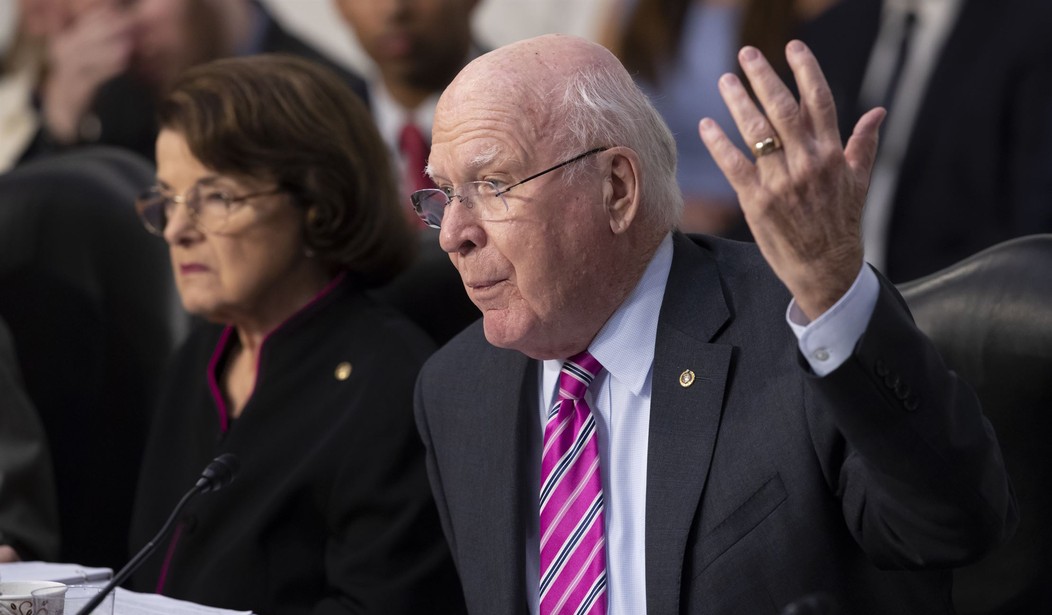“It’s time to put down the gavel,” Patrick Leahy declared a few minutes ago in bowing out of the 2022 midterms. “It’s time to pass the torch to the next Vermonter.” It’s the identity of the next Vermonter that will worry Democrats, who have to defend another open seat in an election cycle that looks to be a disaster already.
It doesn’t help that the heir apparent within Democrat ranks is only seven years younger than Leahy himself:
“It is time to put down the gavel. It is time to pass the torch to the next Vermonter. … It’s time to come home,” Leahy said at a news conference Monday at the Vermont State House in Montpelier from the same room where he announced his first Senate candidacy.
Leahy is chairman of the Senate Appropriations Committee and also president pro tempore of the Senate, making him third in the line of succession to the presidency.
Vermont, where President Biden won with 66 percent of the vote last year, has not been represented in the U.S. Senate by a Republican since 2001. The state’s current junior senator is Bernie Sanders, 80, a self-described democratic socialist who caucuses with the Democrats.
But Phil Scott, the state’s governor since 2017, has demonstrated that a Republican can still prevail in a statewide race in Vermont. He was last reelected last year with nearly 69 percent of the vote.
Rep. Peter Welch (D-Vt.), the state’s only congressman, is viewed as Leahy’s most likely successor. He is 74.
Welch has been in Vermont politics for the last forty years too, only somewhat less successfully than Leahy. He served in the state senate during the 1980s, bailed out to run two unsuccessful campaigns for the House and for governor in the 1990s, and then came back to win his current House seat twenty years ago, taking over for Bernie Sanders.
It’s tough to imagine that a Republican could replace Leahy, even with Scott’s big win last year. If all Democrats can offer in this midterm is a warmed-over lifetime politician, though, maybe the GOP has a shot. More to the point, however, Leahy’s retirement opens up another unexpected point of vulnerability in the Senate. After all, at 81 Leahy was hardly over the hill for the upper chamber. Chuck Grassley just announced his re-election bid at 88, after all.
You’d better believe that the GOP will be recruiting Scott heavily for the midterms in the next few weeks. And now that Leahy’s ending his lock on that seat, maybe Scott could be tempted into a risk-free run. If he loses, he can still remain governor for another two years.
Leahy’s exit will reshuffle the deck on influence as well. If Republicans manage to win the Senate back, Vermont will also lose its longtime leverage on appropriations:
Leahy’s retirement announcement means that both he and Appropriations ranking member Richard C. Shelby, R-Ala., will leave Congress at the same time, ushering in the first time the panel will likely be led by women.
Maine’s Susan Collins is expected to take the helm as the top Republican on the Appropriations Committee at the beginning of the 118th Congress with Washington state’s Patty Murray in line to become the top Democrat.
Murray possibly leaving the Health, Education, Labor and Pensions panel to become the top Democrat on Appropriations could cause something of a domino effect.
Welch will make a rather long-in-the-tooth freshman in the Senate. Vermont voters might want to consider that when they cast ballots in next year’s midterms — among their other considerations, such as just how much socialism they really want. Bernie Sanders might make for a funny gadfly, but did Vermonters really want the Full Bernie?









Join the conversation as a VIP Member